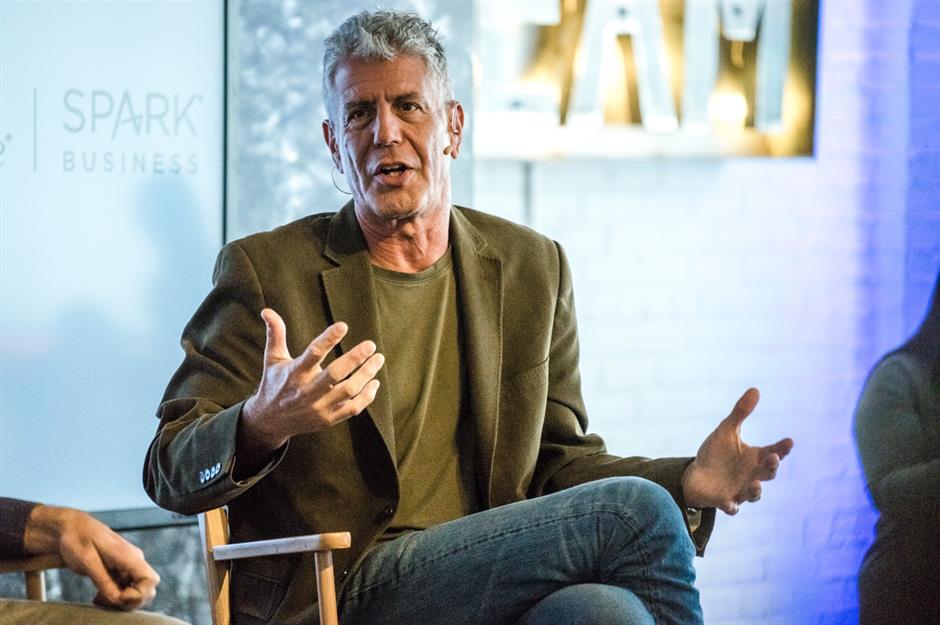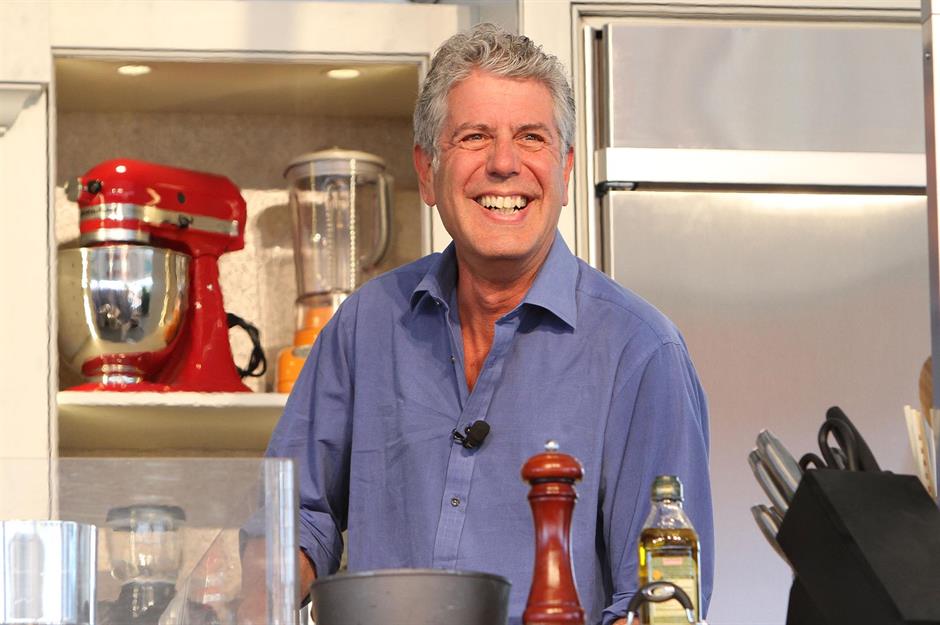Remembering Anthony Bourdain's culinary genius, 5 years on
Gone but not forgotten
While five years have passed since the premature death of the inimitable Anthony Bourdain, his legacy – and the void he left in the culinary world – remains as strong as ever. Bourdain was a chef’s chef who had no time for pomp or pretension; a man of acerbic wit, huge empathy and the ability to write lyrical, honest prose that captivated people's imaginations and fuelled their wanderlust.
Words of culinary wisdom
The chef, writer and broadcaster who meant so much to so many will always be remembered for his best-selling memoir, Kitchen Confidential, and for his pioneering food and travel television shows (notably A Cook’s Tour and No Reservations). That said, he also delivered plenty of valuable culinary advice. Here are some of his best tips, from food prep to hosting advice.
Make a list of all the ingredients you need to buy
He loved spending time eating and drinking with friends, so who better to look to for fool-proof hosting tips than Anthony Bourdain. The late chef suggested you start by making a coherent and comprehensive list of all the ingredients you need – sounds like good advice to us.
Set up your mise en place
This French term is what professional chefs use to describe preparing ingredients, chopping them to the right size and laying them out so they’re ready to go when needed. Anthony suggested doing this before guests arrive, so your time in the kitchen is limited and you’re not abandoning your company.
When hosting, cook something you know
The American chef said if you have guests coming you'd like to impress, make life easy for yourself and cook something you know you’re good at. It’s not the right time for experimenting with something new and stressing yourself out with recipes you're not familiar with.
Repetition is key
When chefs learn how to make a hollandaise sauce, they often mess it up the first, second and even the third time. So don’t expect to be able to make a dish straight away. Anthony regularly emphasised repetition is the key to perfecting a new recipe or technique.
Beef bourguignon is perfect for a party
The late chef once said this rich and meaty, slow-cooked French stew is the perfect party dish. You can make it before your guests arrive or even a couple of days in advance, as it only gets better over time. Plus, it's not too expensive and you don't need amazing cookery skills to make it. Then, when you go to heat it up, your guests can have a cocktail.
Love your slow cooker? Check out these simple summer recipes
Keep burgers simple
Anthony was a big fan of the no-frills approach and said the perfect burger consists of a squishy bun, a hunk of well-minced, good quality beef, and processed, meltable cheese. So before you add anything extra to the tried and tested formula ask yourself two questions: am I making it better and will I still be able to eat it with one hand?
Only change a classic recipe if you’re improving it
Old school in a lot of ways, Anthony was a firm believer you should learn to make the original version of a dish before adapting it or experimenting with it. Then if you still want to tweak it, only do so if you’re improving it. For example, he believed a Caesar salad is better without the chicken and cream cheese should never go on sushi.
Everyone should know how to make an omelette
The admired chef had a few dishes he believed everyone should be able to make. They are an omelette, roast chicken, steak, simple soup or stew, vegetables and pasta. He said they’re easy enough to learn to make well and mastering them is only a matter of will and patience.
Only put eggs in scrambled eggs
When it comes to scrambled eggs, Anthony was a purist and believed they should contain nothing more than fresh eggs, salt and pepper added to a pan of hot butter. He especially believed no water, milk or cream should go into the mix because "you’re not making a quiche".
Crack eggs into a cup
To prevent egg shell getting into a dish, Anthony cracked eggs on a flat surface then tipped them into "an intermediate vessel" such as a cup. This way, any shell accidentally introduced can be easily picked out.
Fold scrambled eggs in a figure of eight
Once in the pan, Anthony said to first let the eggs firm up, then to fold them in a figure of eight. You want them to be fluffy, airy and rippled, rather than tiny, almost chopped-up fragments of cooked egg.
Buy rib steak
For the perfect mix of fat and lean, Anthony advised to opt for steak from the rib section of the animal. This includes prime rib, entrecôte, rib steak and côte de boeuf. Along with sirloin steaks, these are what you get at high-end steakhouses.
Avoid tenderloin
A very tender, fatless meat from inside the loin, Anthony said tenderloin is the most boring and uninteresting piece of meat and looked down on within the industry. Chefs don’t order it because, though it’s tender, there's no depth of flavour and it’s pricey.
Salt meat just before it goes on the grill
Salt dries meat by pulling the moisture out, so you want to leave salting until right before cooking. Anthony's preference was quite a lot of good quality, large grain sea salt plus freshly cracked black pepper.
Grill steak on a medium flame
When it comes to grilling, Anthony said a common mistake is grilling too hot. You want "a nice medium flame" and to control the fire before putting the meat on. He also advised taking it off just short of being done as it will continue to cook.
Now take a look at the world's best chefs reveal their barbecue secrets
Don’t touch steak while it’s resting
When you remove steak from the heat, it should be left to rest on a board for five to seven minutes. During this time, Anthony advised "stay away from it, don’t touch it, don’t poke it, don’t slice it" because it’s continuing to cook and the juices are distributing themselves, so you get a gentle graduation of colour from the pink centre to the outer crust.
Use cheap, fatty meat for stewing
If you don’t have a lot of money to spend on food, Anthony suggested stewing. For something like a beef bourguignon, you don’t want to use expensive filet mignon or sirloin. Cheap, fatty neck or shoulder cuts are best as long cooking times break down the collagen and make the stew buttery and flavourful.
You can cook with cheap wine
Controversially, Anthony said it’s not necessary to use expensive Burgundy in a beef bourguignon and that boxed wine does the job. His reason was you’re cooking off most of the alcohol and infusing it with other flavours.
Have plenty of room in the pan when searing
When searing, Anthony liked to use a heavy bottom pan as it tends to heat up evenly. He also avoided overcrowding it as this cools down the hot oil and prevents the meat from browning properly. However, he also warned against letting it burn so make sure you keep an eye on it.
Never boil stew, soup or stock
While one benefit of slow cooking is it’s relatively hands off, Anthony pointed out you still have to stir every now and again to prevent whatever you're making scorching on the bottom or bubbling away too aggressively. He also said you should never boil anything, whether it’s a stew, soup or stock, just simmer.
Never lie your hand flat when cutting
When cutting onions, Anthony offered some advice for preventing unnecessary injuries. Hold the vegetable with all your fingers and thumb tucked in rather than laid flat. Cut the onion in half, make slices top to bottom, rotate the veg and slice again. This way the risk of cutting your hand is far less.
Time transforms sauces
One thing we’ve learnt from Anthony is to not rush slow cooking. A sauce that tastes like raw meat and cheap wine to start with will mature and mellow over time. Excess liquid and alcohol will evaporate off until you’re left with a thick, rich sauce filled with tender meat.
Ceviche needs thick pieces of fish
Anthony and his friend chef Éric Ripert had some sound advice for cooking the Peruvian raw fish dish, ceviche, in one episode of Parts Unknown filmed in Lima. Firstly, you need to use extremely fresh ingredients. Secondly, the fish must be cut thick, so it stands up to the spices and acid. Finally, it must be eaten as soon as it’s made.
You can’t overcook octopus
When making Portuguese red wine and octopus stew, Anthony had a piece of wisdom for cooking this tricky-to-master seafood. He said it gets tougher and tougher to start with, but eventually reaches a point where more cooking makes it more tender. So it’s actually very difficult to overcook.
Save shellfish heads, abdomens and shells for stock
Though it might sound like extra kitchen admin, Anthony insisted it’s worth keeping the shells, heads and abdomens of shrimp, lobster and crab for making an especially flavourful stock. So next time you make a seafood dish, freeze these parts in a zip-top bag and boil them into a stock for soup or risotto when you need it.
When cooking shellfish – if it’s alive it’s good
One of Anthony's favourite dishes was the garlicky clam pasta, linguine alle vongole. While some home cooks might be nervous about cooking shellfish, the chef insisted "if it’s alive it’s good". Follow in the seafood lover’s footsteps by buying fresh from a fishmonger and only cooking clam shells sealed tightly shut.
Add a knob of butter at end of linguine alle vongole
Though it’s not the traditional Italian way of cooking the dish, Anthony added a large knob of butter at the end of making linguine alle vongole. The secret ingredient makes the dish extra rich and silky.
Butter and sugar transform carrots
When it comes to side dishes, Anthony made sure no less attention went into them than the main. Vichy carrots is a classic French dish he made to accompany turkey and stuffing. It’s chopped carrots cooked in water, butter and sugar – trust us, it’s a level up from steamed veg.
Pastry needs precise measurements
Though he wasn't much of a pastry chef, Anthony had a few pieces of advice for working with patisserie. One was that you need to follow a recipe’s exact measurements, unlike when you’re making sauces or stews where you can taste and add ingredients as you go.
Chilling dough is important
The second piece of pastry wisdom from Anthony was the importance of chilling dough before rolling it. When making the croissant-like French pastry kouign amann with renowned chef Dominique Ansel, he said it needs to be pliable but not soft to work with it properly.
Feeling inspired to bake? Check out fabulous and fruity summer cakes and desserts

